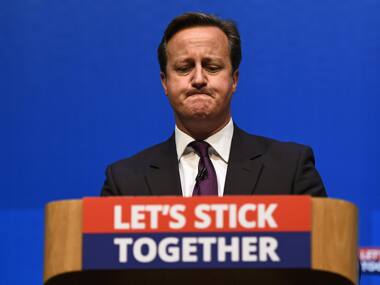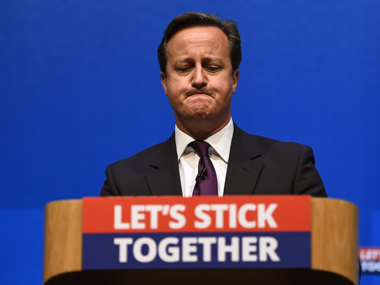London: British Prime Minister David Cameron has survived the Scotland independence referendum, but his last-ditch interventions and promises of greater autonomy has his English heartland clamouring to be given more powers too. Cameron has escaped the miserable fate of becoming the Conservative and Unionist Party prime minister who lost the union – hardly a legacy to be proud of and a result that would probably have forced his resignation. The 47-year-old premier even raised the topic of his own future when he made his final pre-referendum plea in Scotland for voters to stick with the union. [caption id=“attachment_1720865” align=“alignleft” width=“380”]  PM David Cameron. Reuters [/caption] “If you don’t like me, I won’t be here forever. If you don’t like this government, it won’t last forever. But if you leave the UK, that will be forever,” he said. The speech to an invited audience in the oil city of Aberdeen was his most impassioned intervention in the campaign, leaving many wondering why he had left it so late. As he stepped out of his Downing Street office early Friday after the “No” victory in the referendum, Cameron looked visibly relieved. “As I said during the campaign, it would have broken my heart to see our United Kingdom come to an end,” he said. Escapes severe criticism The referendum was always going to be tactically tough for Cameron. A devout unionist, he had little option but to offer a referendum once the pro-independence Scottish National Party (SNP) of First Minister Alex Salmond won a majority in the Scottish Parliament in 2011. “David Cameron will escape some of the more severe criticism of his handling of the referendum that he would have faced if he had lost,” said Andrew Blick, a politics expert at King’s College in London. But he added: “In the long run his party’s electoral prospects might have been better with Scotland outside the Union.” The centre-right Conservatives enjoy less than half the popularity in Scotland that they do in England, and are generally demonised by left-wing nationalists as the root of all evil. In the 2010 UK general election, the Conservatives finished fourth in Scotland with 16.7 percent of the vote and won only one of the 59 seats. Critics argue that Cameron made errors in the campaign, including insisting there would be no third option offering “devo max” – effectively full devolution of domestic powers – on the ballot paper. But while he consistently said more powers would be on offer if Scotland voted “No”, a poll two weeks before the referendum putting the “Yes” camp ahead for the first time shocked the three major Britain-wide parties into offering a swift and substantial package of further devolution. And it was left to Cameron’s Labour predecessor Gordon Brown, who remains popular in his native Scotland, to present it. Cameron, who has led the Conservatives since 2005, had insisted he would not have stood down in the event of a “Yes” vote for independence. However, polls in the final weeks showing the race as neck-and-neck reportedly prompted some backbenchers to start questioning his future. And once backbench Conservatives start plotting against their leaders, as Margaret Thatcher, John Major and Iain Duncan Smith could testify, it is hard to stop them gaining momentum. ‘Fobbed off’ Many Conservative backbenchers are already seething about being locked in a coalition with the centrist Liberal Democrats. Some are now demanding greater powers for England, and notably an end to the current situation whereby UK parliament lawmakers in Scottish seats can vote on matters that now affect only England and not their own constituents – such as health and education – because control has been devolved to Scotland. “The question of English votes for English laws… requires a decisive answer,” he said on Monday. Right-winger John Redwood, who challenged sitting prime minister Major for the Conservative leadership in 1995, is leading the charge. “England this time will not be fobbed off,” he said. “The Scottish vote and attitudes changes things fundamentally – for England as well as for Scotland.” In terms of referendums for Cameron, this might not even be the big one. If he remains prime minster after the May 2015 general election, Cameron has pledged to attempt a renegotiation of Britain’s relationship with the European Union then stage an in-or-out referendum on the outcome, by the end of 2017. The bruising nature of the Scotland campaign may make him reflect on his strategy should he eventually call a referendum on the EU. AFP
Cameron has escaped the miserable fate of becoming the Conservative and Unionist Party prime minister who lost the union – hardly a legacy to be proud of.
Advertisement
End of Article
Written by FP Archives
see more


)

)
)
)
)
)
)
)
)



